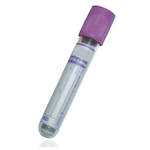Haemoglobinopathy Screening
General Information
Haemoglobinopathy screening is performed to identify abnormal haemoglobins such as sickle haemoglobin, and thalassaemias. It is important to identify such conditions particularly in ante-natal screening and for operations requiring anaesthesia. Abnormal Haemoglobins detected on HPLC will be confirmed using capillary electrophoresis. For more uncommon conditions it may be neccesary to refer the sample to Central Middlesex Hospital for confirmatory testing. This may take several weeks for a definitive result.
Notes
Result interpretation is difficult in patients who have received a recent blood transfusion, or a Bone Marrow Transplant (BMT) or gene therapy. If the patient has received a blood transfusion the haemoglobinopathy screen must be repeated after 4 months from the last transfusion.
Please note patients with T-cell disorders, hyperthyroidism or B12/folate deficiency may present with a falsely elevated HbA2.
Patients with severe iron deficiency may present with a falsely lowered HbA2.
We do not perform haemoglobinopathy screens on patients <6 months old.
Haemoglobinopathy screening can be added to a request up to 72 hours from the time of venepuncture, if specimens stored at 2-8°C and have a valid full blood count. Please contact the laboratory to check if a sample is available on Ext. 40198 (BHH) or 47279 (GHH) or 44527 (SH) or 16920 (QEH).
Reference Range
HbA2 1.5 - 3.5% HbF Adult <1.6% HbF Pregnant Female <5%
Specifications
- EQA Scheme?: Yes
- EQA Status: NEQAS
